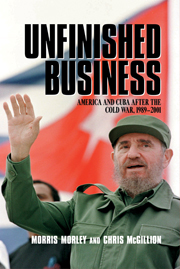Book contents
- Frontmatter
- Contents
- Acknowledgments
- Introduction
- 1 The Bush Administration and Cuba: From Cold War to Deep Freeze
- 2 Clinton and Cuba, January 1993 to February 1996: Closing the Options
- 3 Helms–Burton and the Triumph of Politics over Policy
- 4 Stirring the Waters: Clinton's Missed Opportunities
- Conclusion
- Postscript: Washington's Last Cold War
- Notes
- Index
3 - Helms–Burton and the Triumph of Politics over Policy
Published online by Cambridge University Press: 28 July 2009
- Frontmatter
- Contents
- Acknowledgments
- Introduction
- 1 The Bush Administration and Cuba: From Cold War to Deep Freeze
- 2 Clinton and Cuba, January 1993 to February 1996: Closing the Options
- 3 Helms–Burton and the Triumph of Politics over Policy
- 4 Stirring the Waters: Clinton's Missed Opportunities
- Conclusion
- Postscript: Washington's Last Cold War
- Notes
- Index
Summary
I have one message for Mr Castro today: Adios, Fidel.
Senator Jesse Helms, following the announcement of an agreement between the Clinton White House and Congress on passage of the Helms–Burton legislation
THE shootdown by Cuban jet fighters of two unarmed civilian planes piloted by members of the Miami exile group Brothers to the Rescue (BTTR) occurred two weeks before the Florida presidential primary. The timing was bound to figure in Clinton's calculation of a response, but the fact that it weighed so heavily shocked even the most seasoned Cuba hands in the State Department. When news of the incident broke, the president took the dramatic action of immediately ordering U.S. Air Force jets to the crash site area to protect Coast Guard rescue teams searching for survivors. Secretary of State Warren Christopher, who was in Central America at the time, condemned the attack as a flagrant violation of international law amid contradictory evidence as to whether the planes had been shot down inside or outside Cuban territorial waters. The United Nations Security Council passed a resolution “strongly deploring” Havana's action, but set aside much harsher language proposed by Washington and rejected its request for the imposition of worldwide mandatory sanctions on the island. On February 26, Clinton announced a set of retaliatory measures: the suspension of all charter flights between the United States and Cuba, an expansion of Radio Martí's broadcasting range, new restrictions on visits to and travel within the United States by Cuban officials, and prompt action to reach agreement with Congress on the Helms–Burton legislation “so that it will enhance the effectiveness of the embargo in a way that advances the cause of democracy in Cuba.
- Type
- Chapter
- Information
- Unfinished BusinessAmerica and Cuba after the Cold War, 1989–2001, pp. 98 - 130Publisher: Cambridge University PressPrint publication year: 2002



